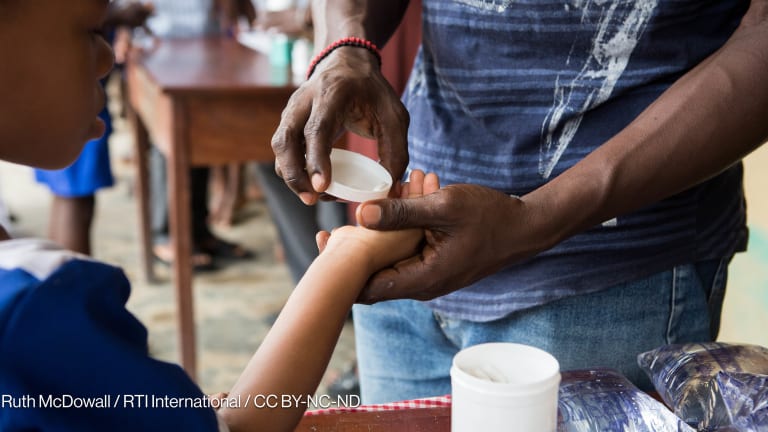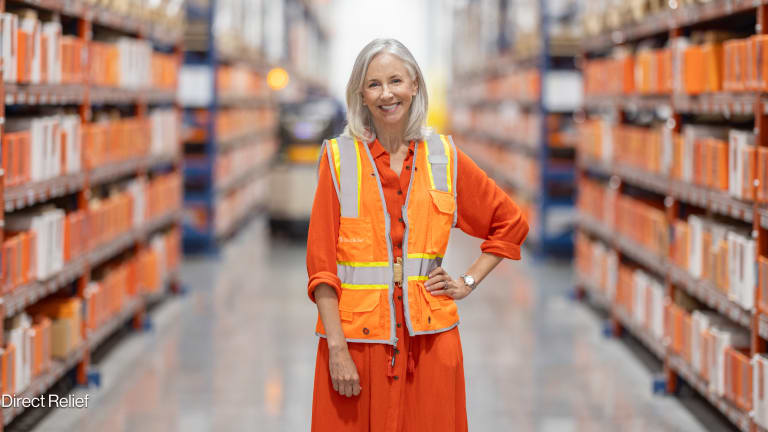
COVID-19 vaccine production could exceed 12 billion doses by the end of the year and, without major bottlenecks, could reach 24 billion by June, according to the International Federation of Pharmaceutical Manufacturers & Associations.
By January, there could be enough vaccines to inoculate every adult on each continent. Next year the world could, for the first time, see supply outstrip demand.
This is all according to modeling conducted by Airfinity, a London-based information and analytics company. Of the projected doses available, about half are expected from Chinese manufacturers.
Sign up for Devex CheckUp
The must-read weekly newsletter for exclusive global health news and insider insights.
But even with an influx of doses, the association said in a statement, vaccine equity to low- and middle-income countries is dependent on high-income nations that have hoarded doses loosening their grip on supplies. Governments need to “strategically release doses so that vaccines leave the production lines and reach the people who need them most, from healthcare workers to vulnerable populations.”
This is because many of the doses in the production queue are still spoken for. For example, Pfizer expects to produce 3 billion doses this year, which have already been allocated. The company expects to produce 4 billion doses next year, of which a large portion have also already been allocated, said Albert Bourla, chairman and chief executive officer at the company, during a press briefing Tuesday.
The modeling report said even if governments in the G-7 group of nations give out booster shots, over 1.2 billion doses will be available for redistribution to low- and lower-middle-income countries this year. Airfinity estimates that by the end of September, the United States, United Kingdom, European Union, and Canada could have 500 million doses available for redistribution.
“Governments holding back doses, stocks, in case of shortages no longer need to do so. The news should be a game changer for vaccine equity,” said Thomas Cueni, director general at IFPMA.
But many aren’t holding their breath expecting these doses to materialize, as promise after promise of vaccine distributions have fallen short this year. Only about 3% of the population on the African continent has been fully vaccinated, with the international COVAX initiative’s supply chain having fallen through and the African Union’s doses only slowly trickling in.
“We've seen in the last year a lot of promises, a lot of projections, and all of these forecasts. But it never materializes,” said Fatima Hassan, founder and director of the Health Justice Initiative in South Africa.
She expressed concern about relying on the same systems that have failed over the past year — allowing pharmaceutical companies to severely limit who manufactures their vaccines — which should have instead led the global community to take an approach that is “radically different.”
And even with this large influx of doses, vaccine equity may not be a possibility until well into next year, Cueni said.
“I believe that we will be able — if there is political will, political leadership — to reach full vaccine equity most likely by mid next year,” he said.
Airfinity projects that it is possible to vaccinate the world's entire adult population by June.
“Now we've been told to still wait; equity for us is something that might happen next year,” Hassan said. “What happens in the meantime? Must we all get sick and die? And have a wave four, a wave five, and a wave six?"
While there has been a push for pharmaceutical companies to broaden the global base of manufacturers, providing them with the technological know-how to produce vaccines, pharmaceutical companies argue that resources are better spent on expanding manufacturing within their current capacity and with their chosen partners.
“I’m not sure what is the point of transferring technology. It is going to take years to transfer,” Bourla said.
But, Hassan said, “there are a lot of myths, particularly around mRNA [messenger RNA] vaccines,” as well as how long it takes to retrofit facilities and get them running.
“The point is, is there the political will to make the commitment?” she said.
“We've seen in the last year a lot of promises, a lot of projections, and all of these forecasts. But it never materializes.”
— Fatima Hassan, founder and director, Health Justice InitiativeAnd even when companies have expanded manufacturing, controversy has followed. Johnson & Johnson has an agreement with South Africa’s Aspen Pharmacare, which is involved in the “fill and finish” process of manufacturing, with vaccine substance from Europe sent to be bottled and shipped at the company’s plant. J&J faced wide-scale pushback after vaccines from that plant were shipped to Europe. The company and the AU have since said that arrangement has been reversed, although the contracts are not publicly available.
“From today onwards, all vaccines produced on African ground will stay in Africa. And that is everything produced by Aspen, and we will continue to support Aspen for expansion of their capacity to do more,” said Paul Stoffels, vice chairman of the executive committee and chief scientific officer at J&J, adding that the company is currently also transferring technology to India's Biological E to produce the actual vaccine substance.









